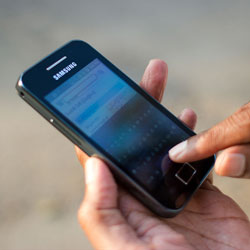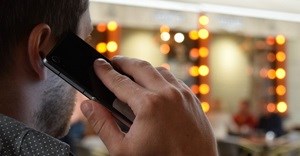Trending




 Sabre EMEA 2024 Awards: Razor PR, Retroviral top SA agenciesDanette Breitenbach
Sabre EMEA 2024 Awards: Razor PR, Retroviral top SA agenciesDanette Breitenbach
Elections 2024
Singapore grapples with smartphone addiction
Psychiatrists in Singapore are pushing for medical authorities to formally recognise addiction to the Internet and digital devices as a disorder, joining other countries around the world in addressing a growing problem.
Singapore and Hong Kong top an Asia-Pacific region that boasts some of the world's highest smartphone penetration rates, according to a 2013 report by media monitoring firm Nielsen.
Some 87% of Singapore's 5.4 million population own smartphones - as Internet-capable phones with cameras are popularly known. In the United States, where there are similar concerns about the impact of smartphones on society, a 65% penetration rate would not even make the top five in Asia Pacific.
Singaporeans also spend on average 38 minutes per session on Facebook, almost twice as long as Americans, according to a study by Experian, a global information services company.

Adrian Wang, a psychiatrist at the upmarket Gleneagles Medical Centre, said digital addiction should be classified as a psychiatric disorder.
"Patients come for stress anxiety-related problems, but their coping mechanism is to go online, go on to social media," Wang said.
He recalled having treated an 18-year-old male student with extreme symptoms.
"When I saw him, he was unshaven, he had long hair, he was skinny, he hadn't showered for days, he looked like a homeless man," Wang told AFP.
Conflict
The boy came to blows with his father after he tried to take away the young man's laptop computer. After the father cut off Internet access in the house, desperation drove the boy to hang around neighbours' homes trying to get a wireless connection.
He was eventually hospitalised, put on anti-depressants and received "a lot" of counselling, Wang said.
"We just needed to break the cycle. He got better, he was discharged from the hospital and I saw him a few more times and he was okay."
Tan Hwee Sim, a consultant psychiatrist at The Resilienz Mind clinic in Singapore, noted that the symptoms exhibited by her young adult patients have changed over the years.
Obsession with online gaming was the main manifestation in the past, but addiction to social media and video downloading are now on the uptrend.
"Internet addiction as a disorder is not even listed in our latest psychiatric manual, it's only listed in the appendix as a disorder that requires further study," she said.
In terms of physical symptoms, more people are reporting "text neck" or "iNeck" pain, according to Tan Kian Hian, a consultant at the anaesthesiology department of Singapore General Hospital.
"It is a commonly observed phenomenon that many people have their heads lowered and are now using their mobile devices constantly on the go, while queuing or even crossing the roads," Tan told AFP.
Not unique
Singapore's problem is not unique, with a number of countries setting up treatment centres for young Internet addicts, particularly in Asia where South Korea, China, and Taiwan have moved to tackle the issue.
In South Korea, a government survey in 2013 estimated that nearly 20% of teenagers were addicted to smartphones. China already has an estimated 300 Internet addiction centres, according to a report on state broadcaster CCTV's website in February.
It also cited a survey showing there may be more than 24 million young Chinese addicted to the Internet.
In Singapore, there are two counselling centres - National Addictions Management Services and Touch Community Services - with programmes for digital addiction.
Trisha Lin, an assistant professor in communications at the Nanyang Technological University, said younger people face a higher risk because they adopt new technology earlier - but can't set limits.
Lin defined digital addiction by a number of symptoms: the inability to control craving, anxiety when separated from a smartphone, loss in productivity in studies or at work, and the need to check one's phone constantly.
Lin warned that parents should avoid giving their children a smartphone or tablet computer to keep them quiet.
"It's like the TV in the past with the babysitters and now it's even worse because now you have the screen with you everywhere," she said, citing the case of a Taiwanese high-schooler who could only sleep clutching her smartphone in case someone tried to call her.
A group of undergraduates from Singapore's Nanyang Technological University launched a campaign late last year encouraging the public to put their smartphones in a facedown position when they are with loved ones.
The "Put it on Friend Mode" campaign drew strong support from students, said Chan Jing Hao, one of the organisers, and there are plans to expand the campaign to schools.
Addiction is so pervasive in Singapore that a "cyber wellness" education programme for pre-school children - and their parents - is set to be launched in the second half of 2014.
Chong Ee Jay, an assistant manager at Touch Community Services, which is launching the drive, said: "We want to give (the parents) a warning to not give these gadgets so early - and learn to withhold them."
Source: AFP, via I-Net Bridge
Source: I-Net Bridge

For more than two decades, I-Net Bridge has been one of South Africa’s preferred electronic providers of innovative solutions, data of the highest calibre, reliable platforms and excellent supporting systems. Our products include workstations, web applications and data feeds packaged with in-depth news and powerful analytical tools empowering clients to make meaningful decisions.
We pride ourselves on our wide variety of in-house skills, encompassing multiple platforms and applications. These skills enable us to not only function as a first class facility, but also design, implement and support all our client needs at a level that confirms I-Net Bridge a leader in its field.
Go to: http://www.inet.co.za



